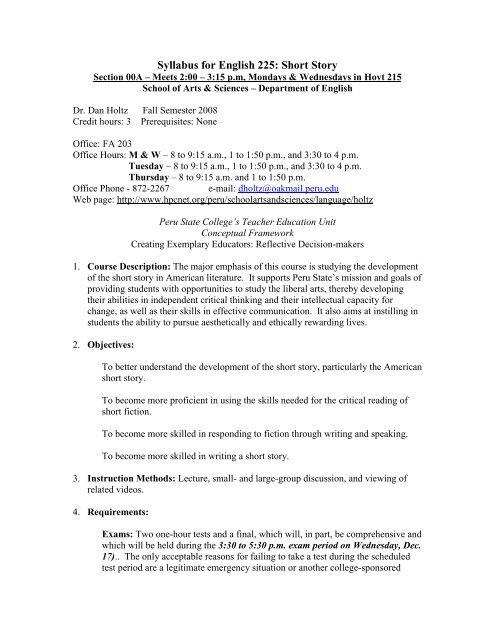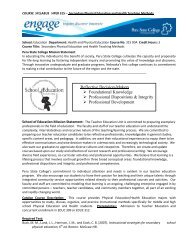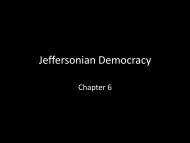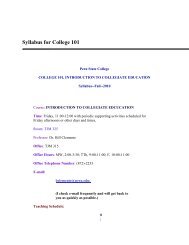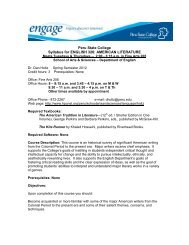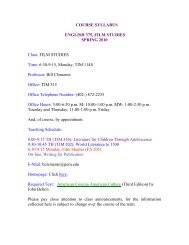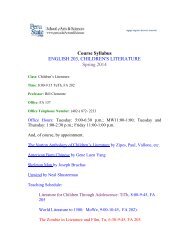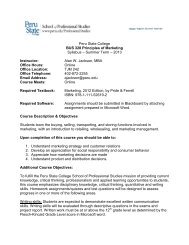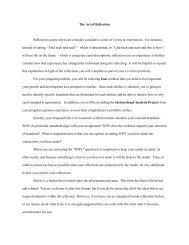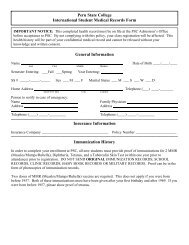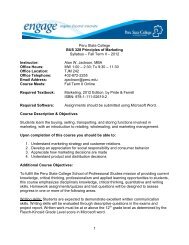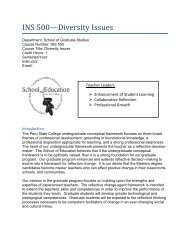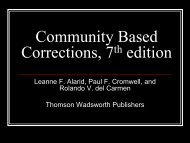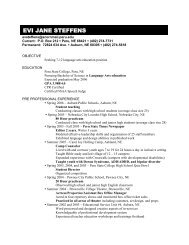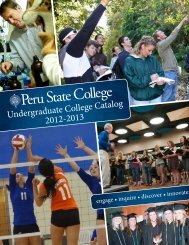Syllabus for English 225: Short Story - Peru State College
Syllabus for English 225: Short Story - Peru State College
Syllabus for English 225: Short Story - Peru State College
- No tags were found...
Create successful ePaper yourself
Turn your PDF publications into a flip-book with our unique Google optimized e-Paper software.
<strong>Syllabus</strong> <strong>for</strong> <strong>English</strong> <strong>225</strong>: <strong>Short</strong> <strong>Story</strong>Section 00A – Meets 2:00 – 3:15 p.m, Mondays & Wednesdays in Hoyt 215School of Arts & Sciences – Department of <strong>English</strong>Dr. Dan Holtz Fall Semester 2008Credit hours: 3 Prerequisites: NoneOffice: FA 203Office Hours: M & W – 8 to 9:15 a.m., 1 to 1:50 p.m., and 3:30 to 4 p.m.Tuesday – 8 to 9:15 a.m., 1 to 1:50 p.m., and 3:30 to 4 p.m.Thursday – 8 to 9:15 a.m. and 1 to 1:50 p.m.Office Phone - 872-2267 e-mail: dholtz@oakmail.peru.eduWeb page: http://www.hpcnet.org/peru/schoolartsandsciences/language/holtz<strong>Peru</strong> <strong>State</strong> <strong>College</strong>’s Teacher Education UnitConceptual FrameworkCreating Exemplary Educators: Reflective Decision-makers1. Course Description: The major emphasis of this course is studying the developmentof the short story in American literature. It supports <strong>Peru</strong> <strong>State</strong>’s mission and goals ofproviding students with opportunities to study the liberal arts, thereby developingtheir abilities in independent critical thinking and their intellectual capacity <strong>for</strong>change, as well as their skills in effective communication. It also aims at instilling instudents the ability to pursue aesthetically and ethically rewarding lives.2. Objectives:To better understand the development of the short story, particularly the Americanshort story.To become more proficient in using the skills needed <strong>for</strong> the critical reading ofshort fiction.To become more skilled in responding to fiction through writing and speaking.To become more skilled in writing a short story.3. Instruction Methods: Lecture, small- and large-group discussion, and viewing ofrelated videos.4. Requirements:Exams: Two one-hour tests and a final, which will, in part, be comprehensive andwhich will be held during the 3:30 to 5:30 p.m. exam period on Wednesday, Dec.17).. The only acceptable reasons <strong>for</strong> failing to take a test during the scheduledtest period are a legitimate emergency situation or another college-sponsored
5. Texts:activity. If you know you must be absent <strong>for</strong> another college-sponsored activityduring the time <strong>for</strong> which a test is scheduled, you must notify me and clear theabsence with me at least two days in advance. Otherwise you will not be allowedto take the test.Quizzes: There will be about 10 to 12 quizzes during the semester (oneapproximately every week and a half) over a short story we are reading. If youmiss the day of a quiz and don’t have an excused absence, you get a zero <strong>for</strong> thatquiz. I do throw out your lowest quiz grade of the semester.<strong>Short</strong> <strong>Story</strong>: The short story you write must be new and original; it does not haveto be any specific length. A good short story is as long as it needs to be. Yourstory must demonstrate, however, that you know how to use the elements offiction (characters, plot, setting, dialogue, motivation, etc.) to develop aconsistent, effective fictional world. During the course of the semester, I will behaving you complete activities and turn in materials that are designed to help youwrite your story.The short story is due Monday, November 24. It must be turned in that day,or I will dock the grade one-half a letter grade <strong>for</strong> each calendar day it islate.Great American <strong>Short</strong> Stories, eds. Wallace and Mary Stegner.The <strong>Short</strong> <strong>Story</strong>: An Introduction, ed. Wilfred Stone.6. Schedule (First Five Weeks):Date Assignment ActivityAug. 25 None Course and <strong>Syllabus</strong> Intro.Aug. 27The Japanese Quince(photocopy) and Section 2,pp. 5-10 in the Introductionof TSS (The <strong>Short</strong> <strong>Story</strong>:An Introduction)Discussion of The JapaneseQuince and the assignmentfrom TSSSept. 3Sept. 8Sept. 10Sept. 15Rip Van Winkle (GASS:Great American <strong>Short</strong>Stories)The Philosophy ofComposition and MS.Found in a Bottle(photocopies)Bartleby the Scrivener(TSS), pp. 121- 144 (Quiz)The Birthmark (on reservein the library) and The**Discussion of Rip VanWinkle and lecture notesabout Washington IrvingVideo on PoeVideo about this storyVideo on NathanielHawthorne
Students are expected to attend class regularly, to arrive punctually, and to complete allassigned work. Attendance is a privilege and a responsibility represented by not only thestudent's investment, but also by a significant investment by the <strong>State</strong> of Nebraska.10. Incomplete Coursework:To designate a student’s work in a course as incomplete at the end of a term, instructorsrecord the incomplete grade (I). Students may receive this grade only when seriousillness, hardship, death in the immediate family, or military service during the semester inwhich they are registered prevents them from completing course requirements. Inaddition, to receive an incomplete, a student must have completed a majority of thecourse’s major requirements. Unless extenuating circumstances dictate otherwise,students must initiate requests <strong>for</strong> an incomplete by filing out an Incomplete GradeCompletion Contract, which requires the student and faculty signature.The Incomplete Grade Completion Contract cites the reason(s) <strong>for</strong> the incomplete anddetails the specific obligations the student must meet to change the incomplete to a lettergrade. If students agree to complete required work prior to the normal deadline <strong>for</strong>making up an incomplete – the end of the subsequent semester – this date must appear inthe contract. The division chair, the instructor, and the student receive signed copies ofthe incomplete Grade Completion Contract.Even if the student does not attend <strong>Peru</strong> <strong>State</strong> <strong>College</strong>, all incomplete course work mustbe finished by the end of the subsequent semester. Unless Faculty Senate approves anextension, if the student does not fulfill contract obligations in the allotted time, theincomplete grade automatically becomes an F.Students who have filed an application <strong>for</strong> graduation are not eligible <strong>for</strong> a grade ofIncomplete.11. Accommodation <strong>State</strong>ment:The Rehabilitation Act of 1973 (public law 93-112) section 504, provides that “nootherwise qualified disabled individual in the United <strong>State</strong>s…shall solely by reason… ofbeing disabled, be excluded from the participation in, be denied the benefits of, or besubjected to discrimination under any program or activity receiving federal financialassistance.”1. It is the student’s responsibility to notify the institution of any special circumstancesthat would affect his/her ability to complete equally in the college environment.Learning disabilities must be appropriately documented.2. While students are encouraged to self-identify at the earliest possible time, studentsmay not know or choose to self-identify, but can still receive services at any timeonce they self-disclose and document.3. Students should contact the office of Student Support Services, Vice President <strong>for</strong>Student Affairs or the Director of Admissions <strong>for</strong> further advisement.12. Academic Dishonesty:Academic integrity is a basic principle that requires the student to take credit only <strong>for</strong>ideas and ef<strong>for</strong>ts that are his/her own. Cheating is defined as the submission of materialsin assignments, exams, or other academic work that is based on sources prohibited by thefaculty member. Cheating shall include, but is not limited to, situations in which astudent:
1. Refers during an academic evaluation to material sources not authorized by thefaculty member.2. Utilizes devices during an academic evaluation that are not authorized by the facultymember.3. Provides assistance to another student or receives assistance from another studentduring an academic evaluation in a manner not authorized by the faculty member.4. Presents as his/her own the ideas or words of another person without customary andproper acknowledgment of sources.5. Knowingly permits his/her words to be submitted by another person without thefaculty member’s permission.6. Acts as a substitute or utilizes a substitute in any academic evaluation.7. Fabricates data in support of laboratory or field work.8. Possesses, buys, sells, obtains, or uses a copy of any materials intended to be used asan instrument of academic evaluation in advance of its administration.9. Alters grade records of his/her own or another student’s work in a course or acomponent of a course.


